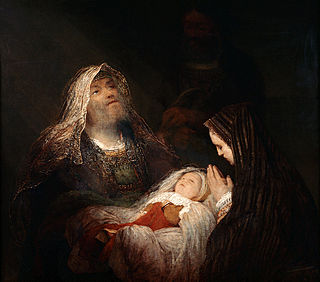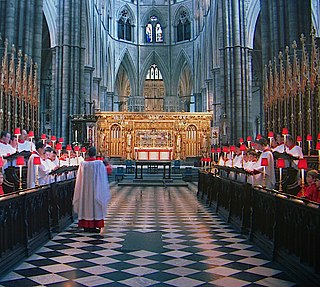
Vespers is a liturgy of evening prayer, one of the canonical hours in Catholic, Eastern Orthodox, Oriental Orthodox, and Lutheran liturgies. The word for this prayer time comes from the Latin vesper, meaning "evening".

The Magnificat is a canticle, also known as the Song of Mary or Canticle of Mary, and in the Eastern Orthodox Church as the Ode of the Theotokos. Its Western name derives from the incipit of its Latin text. This most popular of all canticles falls within the liturgies of the Catholic Church, the Eastern Orthodox Church, the Lutheran Church and the Anglican Communion.

In the practice of Christianity, canonical hours mark the divisions of the day in terms of fixed times of prayer at regular intervals. A book of hours, chiefly a breviary, normally contains a version of, or selection from, such prayers.

Compline, also known as Complin, Night Prayer, or the Prayers at the End of the Day, is the final prayer liturgy of the day in the Christian tradition of canonical hours, which are prayed at fixed prayer times.

The Nunc dimittis, also known as the Song of Simeon or the Canticle of Simeon, is a canticle taken from the second chapter of the Gospel of Luke, verses 29 through 32. Its Latin name comes from its incipit, the opening words, of the Vulgate translation of the passage, meaning "Now you let depart". Since the 4th century it has been used in Christian services of evening worship such as Compline, Vespers, and Evensong.
In Anglican church music, a service is a musical setting of certain parts of the liturgy, generally for choir with or without organ accompaniment.

Lauds is a canonical hour of the Divine office. In the Roman Rite Liturgy of the Hours it is one of the major hours, usually held after Matins, in the early morning hours .

The Liturgy of the Hours, Divine Office, or Opus Dei are a set of Catholic prayers comprising the canonical hours, often also referred to as the breviary, of the Latin Church. The Liturgy of the Hours forms the official set of prayers "marking the hours of each day and sanctifying the day with prayer." The term "Liturgy of the Hours" has been retroactively applied to the practices of saying the canonical hours in both the Christian East and West–particularly within the Latin liturgical rites–prior to the Second Vatican Council, and is the official term for the canonical hours promulgated for usage by the Latin Church in 1971. Before 1971, the official form for the Latin Church was the Breviarium Romanum, first published in 1568 with major editions through 1962.

The Office of the Dead or Office for the Dead is a prayer cycle of the Canonical Hours in the Catholic Church, Anglican Church and Lutheran Church, said for the repose of the soul of a decedent. It is the proper reading on All Souls' Day for all departed souls (Purgatory), and can be a votive office on other days when said for a particular decedent. The work is composed of different psalms, scripture, prayers and other parts, divided into The Office of Readings, Lauds, Daytime Prayer, Vespers and Compline.

Luke 1 is the first chapter of the Gospel of Luke in the New Testament of the Christian Bible. With 80 verses, it is one of the longest chapters in the New Testament. This chapter describes the birth of John the Baptist and the events leading up to the birth of Jesus. Two canticles, the canticle of Mary and the canticle of Zechariah, are both contained within this chapter. The unnamed author of Luke names its recipient, Theophilus, who is most likely a real person, but the term could simply mean a fellow believer, since theophilus is Greek for God lover. Early Christian tradition uniformly affirms that Luke composed this Gospel as well as the Acts of the Apostles, the companion volume to Luke, which is addressed to Theophilus in the same way. The title "The Gospel of Luke", found in many Bibles and some manuscripts, was added later with no indication that it was originally part of the text.
A canon is a structured hymn used in a number of Eastern Orthodox services. It consists of nine odes, based on the Biblical canticles. Most of these are found in the Old Testament, but the final ode is taken from the Magnificat and Song of Zechariah from the New Testament.
Acolouthia in the Eastern Orthodox and Eastern Catholic churches, signifies the arrangement of the Divine Services, perhaps because the parts are closely connected and follow in order. In a more restricted sense, the term "acolouth" refers to the fixed portion of the Office. The portions of the Office that are variable are called the Sequences. While the structure and history of the various forms of the Divine Office in the numerous ancient Christian rites is exceedingly rich, the following article will restrict itself to the practice as it evolved in the Eastern Roman (Byzantine) Empire.
The Book of Odes, also known as the Biblical Odes, refers to a collection of hymns and prayers referencing the Bible and used as a part of liturgies in some denominations. The biblical odes form the basis for the Eastern Orthodox canon sung during matins and other services.

The Ambrosian Rite is a Latin Catholic liturgical Western Rite used in the area of Milan. The Traditional Ambrosian Rite is the form of this rite as it was used before the changes that followed the Second Vatican Council.

Psalm 134 is the 134th psalm from the Book of Psalms, a part of the Hebrew Bible and the Christian Old Testament, beginning in English in the King James Version: "Behold, bless ye the LORD, all ye servants of the LORD". Its Latin title is "Ecce nunc benedicite Dominum". It is the last of the fifteen Songs of Ascents, and one of the three Songs of Ascents consisting of only three verses. The New King James Version entitles this psalm "Praising the Lord in His House at Night".

Evensong is a church service traditionally held near sunset focused on singing psalms and other biblical canticles. It is loosely based on the canonical hours of vespers and compline. Old English speakers translated the Latin word vesperas as æfensang, which became 'evensong' in modern English. Typically used in reference to the Anglican daily office's evening liturgy, it can also refer to the pre-Reformation form of vespers or services of evening prayer from other denominations, particularly within the Anglican Use of the Catholic Church.

Arvo Pärt's Nunc dimittis is a setting of the Latin canticle Nunc dimittis for mixed choir a cappella, written in 2001. It was published by Universal Edition.

Magnificat and Nunc dimittis in D is a choral setting by the Irish composer Charles Wood of the Magnificat and Nunc dimittis for the Anglican service of Evening Prayer. Scored for four-part choir and organ, it was written in 1898. It is also known as Evening Service in D major.
The Daily Office is a term used primarily by members of the Episcopal Church. In Anglican churches, the traditional canonical hours of daily services include Morning Prayer and Evening Prayer, usually following the Book of Common Prayer. As in other Christian traditions, either clergy or laity can lead the daily office. Most Anglican clergy are required to pray Morning and Evening Prayer daily.

Collegium Regale is a collection of choral settings by the English composer Herbert Howells of the canticles for the Anglican services of Mattins, Holy Communion and Evening Prayer. Scored for four-part choir, solo tenor and organ, the pieces were written between 1944 and 1956 "for the King's College, Cambridge". The first of the pieces were first published by Novello in 1947, and they have become a popular piece of music in the Anglican church music repertoire.













